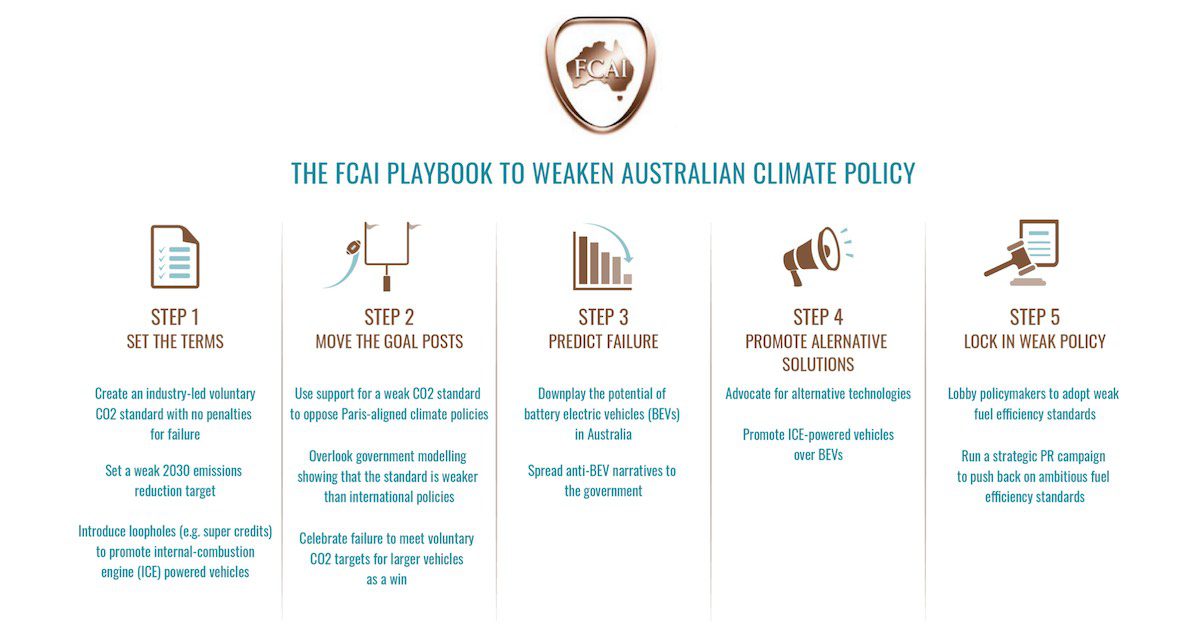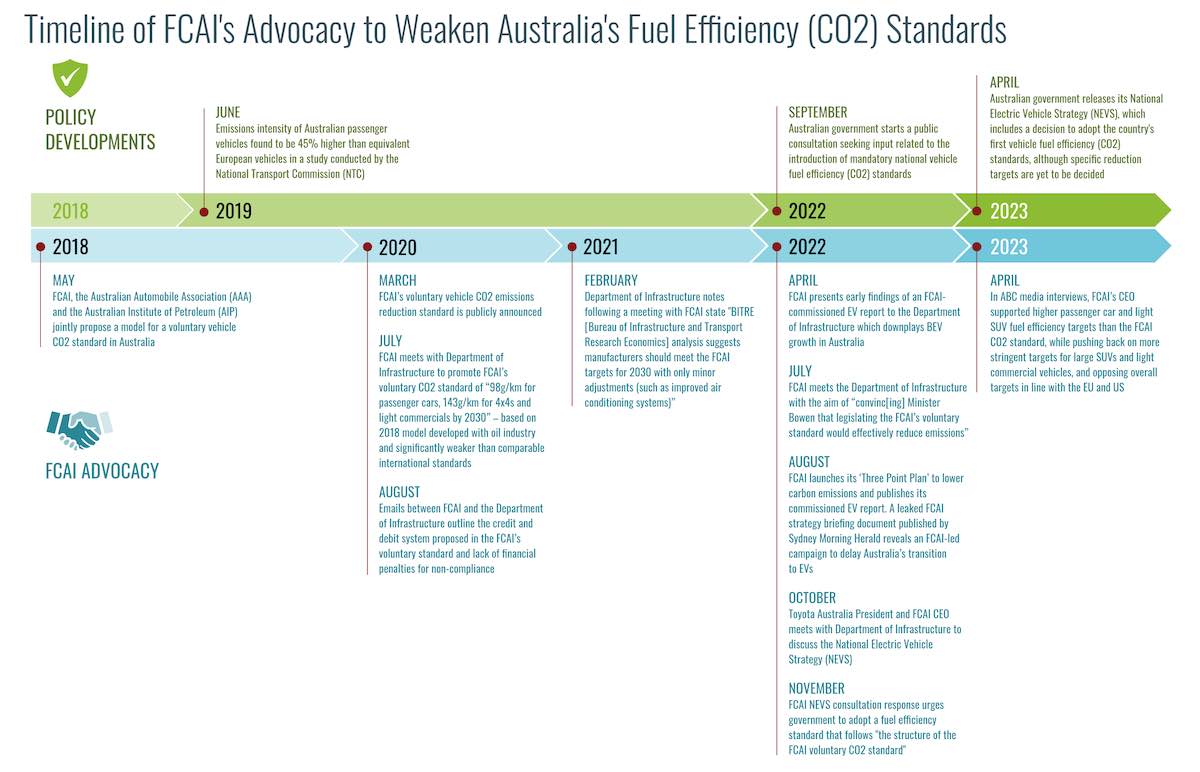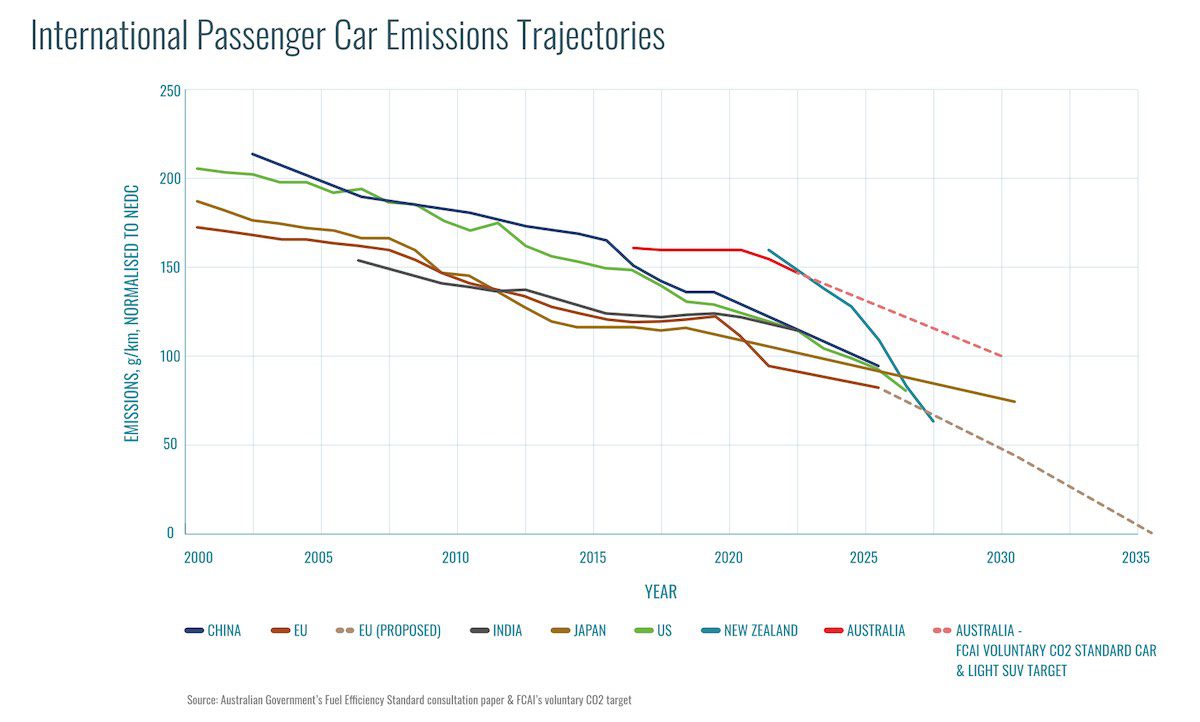A report out today from InfluenceMap sheds new light on the efforts of Australia fossil car lobby – under the auspices of the Federal Chamber of Automotive Industries (FCAI) has been working to weaken Australia’s proposed vehicle emission standards and slow down the uptake of electric vehicles.
The new report, titled The FCAI and Australian Climate Policy draws on more than 500 pages of previously unseen documents from Freedom of Information requests, and reveals how the FCAI had confidential briefings to government officials and bureaucrats in their efforts to stop or weaken climate policy.
It also reveals how it worked with other fossil fuel lobby groups as part of its plan to dilute climate policy.
“This behind-the-scenes effort shows the automotive industry adopting a similar playbook to the oil industry to weaken climate rules aimed at promoting battery electric vehicles,” says InfluenceMap program manager Ben Youriev.
“These documents show the FCAI and some of its key members are advocating to lock-in a longer-term role for combustion-powered vehicles by introducing significantly weaker fuel efficiency rules than in other regions like the US, EU, and New Zealand.
“Such advocacy efforts risk making Australia a ‘dumping ground’ for polluting cars and are a major obstacle for Australia to meet its national climate targets.”
The report notes that FCAI – chaired by Toyota and dominated by the major international car makers – developed its own weak, voluntary CO2 standards and has repeatedly lobbied policymakers to lock in climate rules that are significantly weaker than similar international policies.
If it succeeds in lobbying the Australian government, the FCAI will have a devastating impact on Australia’s transition to electric vehicles and could effectively be responsible for Australia failing to achieve its climate emissions reduction target.
The FCAI’s weak vehicle efficiency standard proposal, which is riddled with loopholes, would also condemn Australians to another decade of health wrecking air pollution.
InfluenceMap has identified the FCAI’s 5 step strategy to undermine the government’s National Vehicle Efficiency Standard (NVES) which would allow petrol and diesel carmakers to continue selling vehicles with pollution rates well above almost every other region in the world.

- Set the terms The FCAI set the terms of what climate regulation should look like for the sector. It implemented voluntary and industry-created CO2 standards for vehicles with a weak 2030 target, and promoted them to the government as the key decarbonization solution.
- Move the goal posts The FCAI moved the goalposts on what Australian climate policy could and should achieve. It used its support for its own, weaker CO2 standard to oppose more stringent federal climate regulations in 2021-23, but does not appear to have publicly responded to government modeling on the low ambition of its voluntary standards compared to international policies.
- Predict failure the FCAI predicted failure by downplaying the potential of rapid battery electric vehicle (BEVs) growth in Australia and promoting anti-BEV narratives to the government.
- Promote alternative solutions the FCAI promoted alternative technologies to BEVs, that could enable a longer-term role for ICE-powered vehicles to policymakers.
- Lock in weak policy Directly lobbying policymakers to lock in weak fuel efficiency standards in line with its voluntary CO2 standards while appearing to run a parallel PR campaign against higher-ambition standards.
Timeline shows industry group’s strategy to undermine standards
InfluenceMap also provides a timeline of the lobbying strategy going back five years. Starting in 2018, the FCAI joined with the Australian Automobile Association (AAA) and the Australian Institute of Petroleum (AIP) in proposing a voluntary vehicle CO2 standard.
In 2019 the National Transport Commission (NTC) found that the emissions intensity of Australian passenger vehicles was 45% higher than equivalent European vehicles.
In July 2020 the FCAI met with the Department of Infrastructure to promote its voluntary standard of 98g CO2/km for passenger cars and 143g CO2/km for 4x4s and light commercial vehicles starting from 2030 which is significantly weaker than comparable international standards.
For reference the EU’s current standard, which has been enforced since 2021, mandates 95 g CO2/km for passenger cars and 147 g CO2/km for vans. From 2030 the EU standard will cut the passenger vehicle standard by 37.5% to 59 g CO2/km and vans by 31% to 101.4 g CO2/km.
This means that the EU 20230 vehicle emission standard will be 40% lower for passenger cars and 29% lower for vans compared to the FCAI’s proposed standard which will effectively make Australia a dumping ground for the world’s most polluting vehicles.

InfluenceMap’s FOI request uncovered notes from a meeting between FCAI and the Department of Infrastructure from February 2021. The notes say “BITRA (Bureau of Infrastructure and Transport Research Economics) analysis suggests manufacturers should meet the FCAI targets for 2030 with only minor adjustments.”
In April the FCAI presented a report that it had commissioned to the Department of Infrastructure which downplayed the BEV growth in Australia.
In the report the FCAI forecasted that BEVs would only make up 3% of sales in 2023 and just 18% by 2030. The FCAI forecast has been proven to highly inaccurate with nationwide BEV sales hitting 8% in April 2023 and as high as 20% in the ACT.
At current growth rates BEVs could very well hit 20% nationwide by 2024, 6 years earlier than the industry lobby group’s forecast. EV uptake is set to grow exponentially from now on.
InfluenceMap says that during a July 2022 meeting with policymakers, the FCAI made it clear that they aimed to convince Australia’s Minister for Climate Change that legislating the FCAI’s voluntary CO2 standard “would effectively reduce emissions” according to a government email.
This despite government’s own modeling indicating that the FCAI’s voluntary CO2 standard would be weaker than even Trump-era US regulations, as well as the EU.
Australia’s vehicle emission trajectory well behind the rest of the world
In the report InfluenceMap also provided graphs showing just how much worse Australia’s passenger and light-commercial vehicle emissions trajectories are compared to the rest of the world.
InfluenceMap also shows that the FCAI proposed voluntary standard does nothing to bridge the gap showing nations like New Zealand are taking a much more aggressive approach to reducing transport emissions.


EV council urges government to ignore FCAI’s push for bonus credits
InfluenceMap says FCAI incorporated multiple loopholes in its CO2 standard that appear to weaken its stringency.
A July 2020 FCAI presentation to the Department for Infrastructure stressed that voluntary CO2 standard is “similar to international CO2 standards but using features relevant to the Australian market” including “Super Credits … Off Cycle Credits …A/C gas credit … Credits/debits allowing for product cycles”.
Last week the Electric Vehicle Council published the key recommendations from its submission to the NVES. Head of policy at the EVC Jake Whitehead says the government should ignore the FCAI’s push for bonus credits which would allow the industry to continue selling higher emitting vehicles.
“The two types of bonus credits that the federal government should not consider are off-cycle credits and air-conditioning credits,” said Whitehead.
“These concessions effectively provide free credits for features that are already built into many Australian cars and as result weaken the overall ambition of the standard.
“Any weakening of the standard through the inclusion of these bonus credits risks further delaying the supply of more low and zero emission vehicles to Australia.” said Whitehead.
Government’s consultation is open until May 31. The EVC is encouraging people to sign and endorse its recommendations for the new vehicle efficiency standard.

Daniel Bleakley is a clean technology researcher and advocate with a background in engineering and business. He has a strong interest in electric vehicles, renewable energy, manufacturing and public policy.

